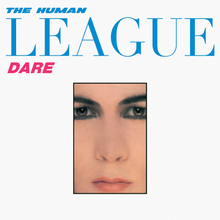Seconds (Human League song)
| Dare | ||||
|---|---|---|---|---|
 |
||||
| Studio album by The Human League | ||||
| Released | 16 October 1981 | |||
| Recorded | March–September 1981 | |||
| Studio | Genetic Sound, Streatley, Berkshire | |||
| Genre | Synthpop, new wave | |||
| Length | 40:46 | |||
| Label | Virgin, A&M (US) | |||
| Producer | Martin Rushent, The Human League | |||
| The Human League chronology | ||||
|
||||
| Singles from Dare | ||||
|
||||
| Professional ratings | |
|---|---|
| Review scores | |
| Source | Rating |
| AllMusic | |
| Encyclopedia of Popular Music | |
| Mojo | |
| Q | |
| Record Collector | |
| Rolling Stone | |
| The Rolling Stone Album Guide | |
| Spin Alternative Record Guide | 9/10 |
| Uncut | |
| The Village Voice | B− |
Dare (released as Dare! in the US) is the third studio album by British synthpop band The Human League. The album was recorded between March and September 1981 and first released in the UK on 16 October 1981, then subsequently in the US in mid-1982.
The style of the album is the result of the drastic change from a experimental avant-garde electronic group into a commercial pop group under Philip Oakey's creative direction following the departure of fellow founding members Martyn Ware and Ian Craig Marsh. Dare became critically acclaimed and has proved to be a genre-defining album, whose influence can be felt in many areas of pop music. The album and its four singles were hugely successful commercially, with the album reaching #1 in the UK and being certified Triple Platinum by the BPI.
A remix album based on Dare, Love and Dancing, was released in 1982.
Dare is the third studio album from the Human League but differs greatly from their previous two, Reproduction and Travelogue. This is due to a split in the original line up, the subsequent reformation of the band with new personnel and the difference in musical style under Philip Oakey's direction.
In January 1981 the Human League consisted of just Oakey and Philip Adrian Wright with newly recruited teenage dancers/backing vocalists Joanne Catherall and Susan Ann Sulley. After the acrimonious split of the original band in October 1980 and the subsequent recruitment of Sulley and Catherall, the new band had only just survived a European tour by bringing in session keyboardist Ian Burden to temporarily assist. The band were deeply in debt and only barely commercially viable. Under pressure to produce results from Virgin Records, original members Oakey and Wright returned to Monumental Studios in Sheffield to start recording demo tracks. They recorded the track "Boys and Girls" from the 1980 tour, which Virgin then quickly released as a single. The style of "Boys and Girls" belonged to the original, now defunct Human League. Sulley and Catherall who were busy with school, were not used other than for publicity. The synthesiser work was basic as Oakey and Wright admitted they lacked the skill of Marsh and Ware. When "Boys and Girls" peaked at number 47 in the UK, Oakey realised that he would need to bring in professional help to take the band in the more pop and commercial sounding direction he wished.
...
Wikipedia
